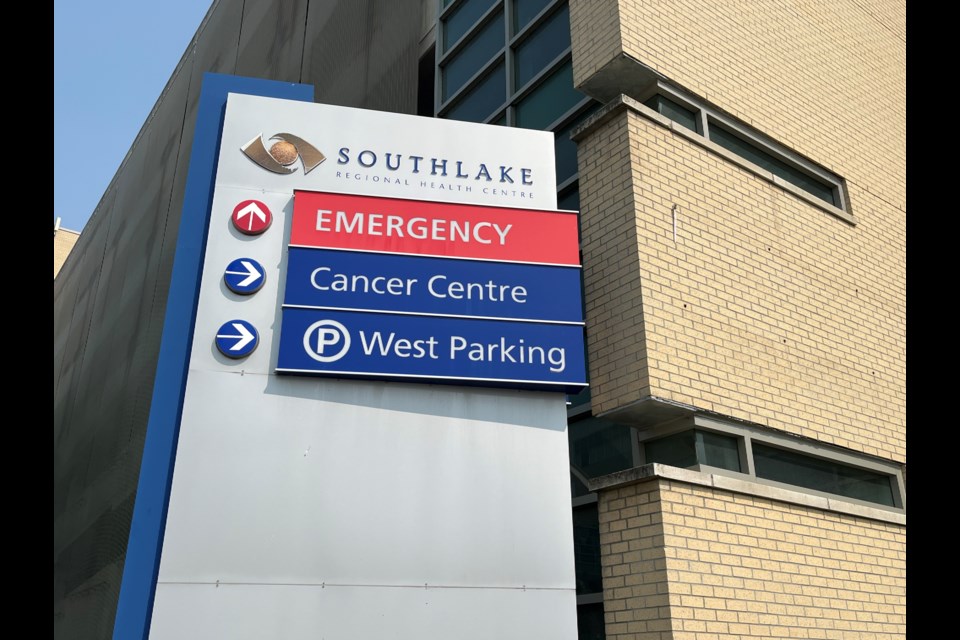Cancer treatment is a challenging journey for anyone, but for young adults between the ages of 18 and 43, some of the challenges extend beyond medical treatment.
That’s where Southlake Regional Health Centre, in partnership with Princess Margaret Cancer Centre, hopes to step in and help younger cancer patients navigate their path toward recovery.
In 2022, Southlake became the first organization to partner with the Princess Margaret Cancer Care Network and the Adolescent and Young Adult (AYA) Cancer Program aims to provide unique care close to home, including issues related to sexual health, fertility, relationships and more – ensuring holistic care is available to address “medical, emotional, social and practical concerns.”
“It is a very nuanced cancer experience compared to the pediatric population or adults who are beyond the age of 43,” says Samantha Scime, AYA clinical nurse specialist at Southlake and Princess Margaret. “There are unique concerns with this population that other folks don’t experience because it is a highly developmental time in their adolescent-to-young adult space. We have people starting their careers — maybe they’re in school, lots of focus on building social networks, friendships, relationships, navigating family and dependents, having young families, starting young families, buying homes — it’s a very unique time and cancer is super-destructive. We’re able to offer additional support, especially in the context of coping and some of those other domains we focus on.”
The age of 43 might seem an arbitrary ceiling to some, but Scime says “fertility preservation and issues with sexual health are top of mind” for people in this demographic and their needs will continue to be evaluated as the program develops and moves forward.
The partnership between Southlake and Princess Margaret helps support improved access to care for Southlake patients, bringing it close to home for the communities the Newmarket-based hospital serves – a particularly valuable element for younger patients.
“Really and truly some of them will go through their cancer care without ever being in a waiting room next to somebody getting treatment that is in the same age group as them or in a similar life stage and dealing with the same impacts as cancer,” says Dr. Alisha Kassam, medical director of the AYA Program. “We hear from many of our patients that that’s quite lonely for them. It also means that although we have amazing oncologists at Southlake, similar to other cancer centres, they [didn’t] have the expertise, the infrastructure, the tailored supports to provide this specialized care that this population requires and deserves.
“Princess Margaret was one of the first cancer centres in Ontario to really get on board and recognize the need for this support, particularly for key domains such as fertility, body image, sexual health, school and work transition – they set up a program and now it is very robust, very well-served.”
Kassam says, as someone with connections to Princess Margaret Hospital and the programs they have, she wanted to bring it to the local level and is thankful the Southlake board was supportive in getting it off the ground. Outside of Princess Margaret in Toronto, and hospitals in Ottawa, there are few programs tailored to this population, she adds.
“The cancer system is really tailored to older adults because they are the majority (of those diagnosed),” she says, adding that the adolescent and young adult demo is often thought of as a “forgotten group.”
“Part of that is because it is really all related to this lifestyle and feeling invincible — ‘I’m at the start of my career, I’m building a family, fostering relationships, being independent’ — then all of a sudden cancer impacts that and young adults tell us all the time they just want to feel normal, they want to go back to those things, and part of what I think this program does is (help) bring some normalcy to that.”
Adds Scime, “We want to improve awareness. Many folks don’t go to their regular checkups thinking about screening and what that education needs to look like in the future and how we can coordinate with public health and promote all those health promotion factors. It’s not just top of mind for young people. They are navigating so many different things at that time and because, as Alicia said, the incidents of cancer in this population is relatively low at four per cent and they don’t have other friends who are going through this, it is not something they are necessarily thinking about.”
As the program develops for adolescent and young adult patients, Kassam says there are a lot of opportunities out there to improve cancer centres as a whole and integral to that is education.
They aim to ensure everyone is comfortable with asking the right questions, even if they might seem “taboo” at an oncology centre.
“We should be asking everyone about intercourse, intimacy, about sexual challenges, not just young adults. It does go a long way into building a whole cancer centre and a whole system,” she says. “(We want) every young adult with cancer who walks in the door at Southlake Cancer Centre to be connected to this program and by virtue of it, to be connected to other young adults facing a similar diagnosis as well as supports for them. I would like to see, after a year, hopefully, Southlake to be a model for other cancer centres to learn from and want to develop their own programs and I would like to see the patient’s voice elevated as well to get more patient partners on our team, as well as self-referrals and using their voices to figure out what they need. We might think we know all the answers but we want to hear from them.”
Brock Weir is a federally funded Local Journalism Initiative reporter at The Auroran.



